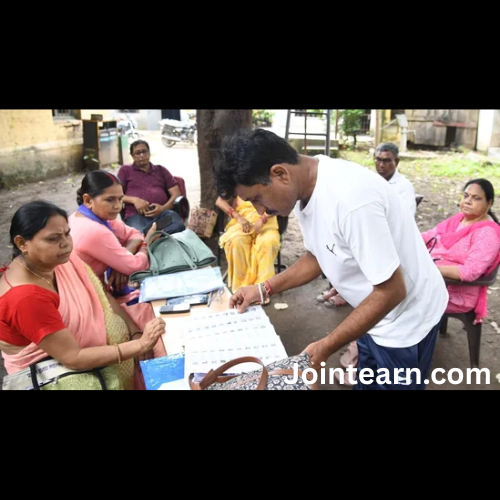
The Election Commission of India (ECI) is set to launch a pan-India exercise next week for the Special Intensive Revision (SIR) of electoral rolls, starting with around 10 to 15 states and Union territories. This first phase will include poll-bound states such as Tamil Nadu and West Bengal, marking a significant step toward ensuring clean, accurate, and up-to-date voter lists ahead of upcoming assembly elections. Officials confirmed that the schedule for the SIR will be formally announced on Monday.
Purpose of the Exercise
The nationwide SIR aims to identify and eliminate discrepancies in electoral rolls, verify voters’ credentials, and ensure that every eligible citizen has the opportunity to participate in the democratic process. The exercise will cover states and UTs where assembly elections are due in early 2026, including Assam, Tamil Nadu, Puducherry, Kerala, and West Bengal.
The SIR process is critical in preventing irregularities such as duplicate entries, outdated addresses, or inclusion of ineligible voters. It is also intended to address grievances raised by citizens about missing names, incorrect details, or other inaccuracies in the rolls. By revising and updating voter lists comprehensively, the ECI seeks to strengthen the credibility and transparency of the electoral process across the country.
Exclusion of Certain States
While the SIR will begin in several key states next week, officials clarified that states currently conducting local body elections or where such elections are imminent will be excluded from the initial phase. The reason is that election authorities in those regions are fully engaged in poll duties, making it operationally challenging to undertake simultaneous roll revisions. The SIR in these states will be scheduled in subsequent phases once poll-related obligations are completed.
Reference Points for the Revision
The upcoming SIR follows a model similar to the exercise conducted recently in Bihar. In that state, the final electoral roll, comprising nearly 74.2 million voters, was published on September 30. Bihar will go to the polls in two phases—on November 6 and 11—with counting scheduled for November 14.
In most states participating in the upcoming revision, the ECI has already undertaken a mapping of current electors against records from their last SIR, which in many cases was conducted between 2002 and 2004. These older rolls serve as the baseline for verifying and updating the current lists. The process involves cross-checking existing entries, identifying duplicate or ineligible entries, and verifying the details of voters who have shifted residences or undergone other demographic changes since the last revision.
Legal Oversight and Grievance Redressal
The ECI has been proactive in addressing legal concerns related to the SIR. On Saturday, the commission informed the Madras High Court that the SIR of Tamil Nadu’s electoral rolls will commence alongside other states facing upcoming elections.
Appearing before a bench of Chief Justice Manindra Mohan Shrivastava and Justice G Arul Murugan, ECI counsel Niranjan Rajagopal assured the court that grievances raised by a petitioner seeking re-verification of voter rolls in Chennai’s T Nagar constituency would be addressed during the proposed revision. The bench noted the commission’s submission and adjourned the matter for a week.
This legal oversight underscores the ECI’s commitment to ensuring that citizens’ concerns are considered during the SIR, and that no eligible voter is inadvertently left out or wrongly deleted from the rolls.
Political Implications and Criticism
The scale of the upcoming SIR is substantial, with millions of voters to be verified across multiple states. While the exercise has generally been praised for its intent and comprehensiveness, opposition parties have raised concerns in past exercises, alleging large-scale deletions and discrepancies in updated voter lists. Critics argue that errors or omissions could potentially disenfranchise eligible voters, affecting the fairness of upcoming elections.
In Bihar, for instance, the recent SIR drew mixed reactions. The state’s electoral roll revision was praised for bringing accuracy and uniformity to the voter database, but opposition parties highlighted alleged discrepancies and called for enhanced transparency in the verification process. The upcoming nationwide SIR is expected to adopt lessons from Bihar’s exercise, with additional mechanisms for grievance redressal and verification to minimize errors.
Steps for Citizens
The ECI has urged citizens to participate actively in the SIR process. Individuals can verify their entries, submit corrections, or raise objections where necessary. The process typically involves checking personal details, including name, age, and address, and providing proof of identity and residence if corrections are needed.
The SIR is also an opportunity for newly eligible voters—those who have turned 18 since the last revision—to be included in the rolls. By engaging citizens and ensuring transparency, the ECI hopes to create an updated and accurate electoral database ahead of key assembly elections.
Conclusion
The nationwide Special Intensive Revision of electoral rolls represents a crucial step toward strengthening India’s democratic processes. Beginning next week in Tamil Nadu, West Bengal, and other key states, the exercise seeks to ensure that electoral rolls are comprehensive, accurate, and free from discrepancies. While challenges and political scrutiny are inevitable, the SIR is expected to enhance voter confidence and facilitate fair and transparent elections in the coming months.


Leave a Reply